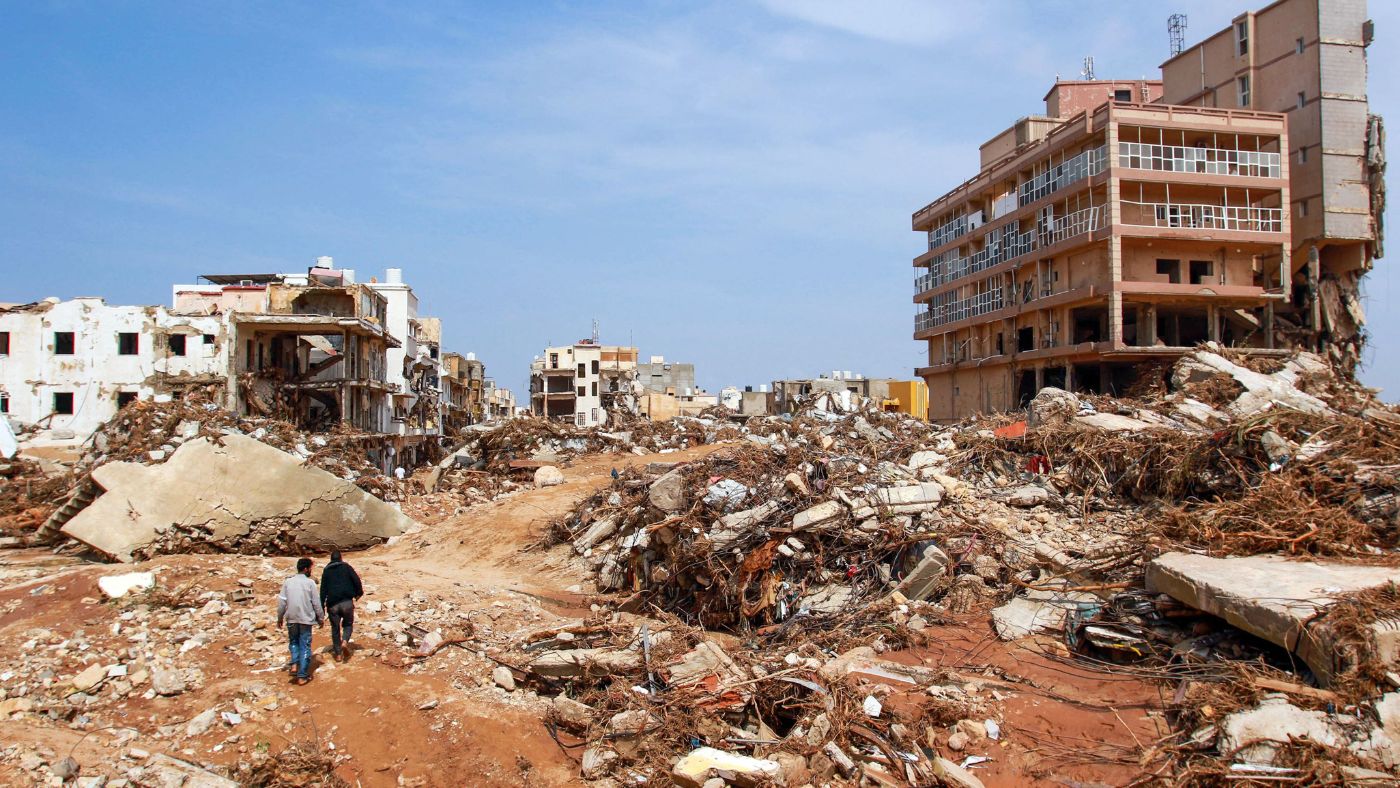Libya floods: death toll set to rise with 10,000 reported missing
More than 6,000 people reported dead, with hundreds of bodies still washing ashore

A free daily email with the biggest news stories of the day – and the best features from TheWeek.com
You are now subscribed
Your newsletter sign-up was successful
The death toll from two catastrophic dam collapses in eastern Libya has risen to 6,000, a unity government official has said, as rescue workers continue to recover hundreds of bodies from the coastal city of Derna.
At least 10,000 people are missing, the Red Cross confirmed, following flooding that struck Derna over the weekend after the two dams collapsed. Local officials have said that many of those yet to be found are unlikely to be alive.
The damage was caused by a "raging torrent of mud-brown water", The Guardian reported, which "swept away several major bridges" causing many of the city's multi-storey buildings to collapse.
The Week
Escape your echo chamber. Get the facts behind the news, plus analysis from multiple perspectives.

Sign up for The Week's Free Newsletters
From our morning news briefing to a weekly Good News Newsletter, get the best of The Week delivered directly to your inbox.
From our morning news briefing to a weekly Good News Newsletter, get the best of The Week delivered directly to your inbox.
Entire neighbourhoods have been washed away, with many bodies swept out to sea, Tariq al-Kharraz, a representative of Libya's eastern government, said. Waves at Derna are "constantly dumping dozens of bodies", said Hichem Abu Chkiouat, the minister of civil aviation in the administration that runs eastern Libya.
Chkiouat appealed for international assistance, adding that Libya does not have the facility or experience to deal with a disaster of this scale.
Recovery efforts are "likely to be complicated by the weakness of the state", said the Financial Times. Libya has been "blighted by years of chaos and conflict" since dictator Muammar Gaddafi was toppled in October 2011. "Rival factions have since carved the country into a patchwork of fiefdoms," the paper said, complicating its ability to respond to the catastrophe.
The dams upstream from storm-hit Derna "had not been maintained for more than two decades", said Al Jazeera. And according to the city's deputy mayor, Ahmed Madroud, the infrastructure was not built to withstand such devastating floods.
A free daily email with the biggest news stories of the day – and the best features from TheWeek.com
"The dams have not been maintained since 2002, and they are not big", Ahmed Madroud told the broadcaster. According to Madroud, the first dam that failed was 70 metres (230 feet) tall. But once it burst, water rushed through and began building up behind the second dam which eventually collapsed as well.
The United Nations Office for the Coordination of Humanitarian Affairs said emergency response teams have now been mobilised to help on the ground as the search and rescue effort continues.
Arion McNicoll is a freelance writer at The Week Digital and was previously the UK website’s editor. He has also held senior editorial roles at CNN, The Times and The Sunday Times. Along with his writing work, he co-hosts “Today in History with The Retrospectors”, Rethink Audio’s flagship daily podcast, and is a regular panellist (and occasional stand-in host) on “The Week Unwrapped”. He is also a judge for The Publisher Podcast Awards.
-
 The environmental cost of GLP-1s
The environmental cost of GLP-1sThe explainer Producing the drugs is a dirty process
-
 Nuuk becomes ground zero for Greenland’s diplomatic straits
Nuuk becomes ground zero for Greenland’s diplomatic straitsIN THE SPOTLIGHT A flurry of new consular activity in Nuuk shows how important Greenland has become to Europeans’ anxiety about American imperialism
-
 ‘This is something that happens all too often’
‘This is something that happens all too often’Instant Opinion Opinion, comment and editorials of the day
-
 Epstein files topple law CEO, roil UK government
Epstein files topple law CEO, roil UK governmentSpeed Read Peter Mandelson, Britain’s former ambassador to the US, is caught up in the scandal
-
 Iran and US prepare to meet after skirmishes
Iran and US prepare to meet after skirmishesSpeed Read The incident comes amid heightened tensions in the Middle East
-
 Israel retrieves final hostage’s body from Gaza
Israel retrieves final hostage’s body from GazaSpeed Read The 24-year-old police officer was killed during the initial Hamas attack
-
 China’s Xi targets top general in growing purge
China’s Xi targets top general in growing purgeSpeed Read Zhang Youxia is being investigated over ‘grave violations’ of the law
-
 Panama and Canada are negotiating over a crucial copper mine
Panama and Canada are negotiating over a crucial copper mineIn the Spotlight Panama is set to make a final decision on the mine this summer
-
 Why Greenland’s natural resources are nearly impossible to mine
Why Greenland’s natural resources are nearly impossible to mineThe Explainer The country’s natural landscape makes the task extremely difficult
-
 Iran cuts internet as protests escalate
Iran cuts internet as protests escalateSpeed Reada Government buildings across the country have been set on fire
-
 US nabs ‘shadow’ tanker claimed by Russia
US nabs ‘shadow’ tanker claimed by RussiaSpeed Read The ship was one of two vessels seized by the US military